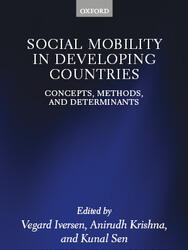Book
Social Mobility in Developing Countries
Concepts, Methods, and Determinants
Social mobility — defined as the ability to move from a lower to a higher level of education or occupational status, or from a lower to a higher social class or income group — is the hope of economic development and the mantra of a good society.
There are disagreements about what constitutes social mobility, but there is broad agreement that in a just society all people should have a roughly equal chance of success regardless of the economic status of the families into which they were born. Concerns about rising inequality have engendered a renewed interest in social mobility, especially in the developing world.
Three basic questions configure the examinations of diverse aspects of social mobility presented in the book:
- How to assess the extent of social mobility in a given development context when the datasets required by conventional analysis and measurement techniques are at best limited and often almost entirely unavailable?
- How to reliably identify the drivers and the inhibitors of social mobility in particular developing country contexts?
- How to acquire the knowledge required to design interventions that are likely to raise social mobility, either by increasing upward mobility or by lowering downward mobility?
 Join the network
Join the network